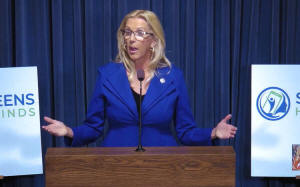Illinois legislator seeks social media ID others say could violate free
speech
 Send a link to a friend
Send a link to a friend
 [February 15, 2024]
By Greg Bishop | The Center Square [February 15, 2024]
By Greg Bishop | The Center Square
(The Center Square) – An Illinois state senator is looking to regulate
social media companies in order to protect children from harm, but some
see a patchwork of laws across the country causing problems and possibly
infringing on constitutional rights.
Last week, state Sen. Sue Rezin, R-Morris, revealed some of her
legislative priorities in her “Safe Screens, Healthy Minds” initiative.
“We cannot rely upon social media companies to self-regulate because at
every turn they have openly and behind the scenes resisted measures to
protect minors,” Rezin said during a news conference.
Among the proposals are to require high default privacy settings for
children and parents. Another would require social media companies to
have a free customer support service to address complaints. A third
would require platforms to create an identity verification process.
Rezin said requiring ID verification is crucial.
“The need for some form of identity verification on these platforms is
something that has been repeatedly brought up by concerned parents and
educators whenever I discuss this issue,” she said.
David McGarry, a policy analyst with the Taxpayers Protection Alliance,
said states passing standalone measures regulating services like those
found on the internet could force consumers to use tools regulated by
the most draconian policies, let alone possibly running afoul of
constitutional rights.

[to top of second column]
|

Senator Sue Rezin (R) -Morris
BlueRoomStream

“The First Amendment protects your right to speak anonymously. This is
settled law,” McGarry told The Center Square. “While there are certainly
many people online who I think most of us would agree abuse this right,
that doesn’t mean that under our constitutional system the government
can come in and make those calls and force people to identify
themselves.”
Jason Kelley, Activism director at the Electronic Frontier Foundation,
said requiring social media ID verification will “harm everyone’s
ability to speak out and share information, regardless of their age.”
“The collection of such data necessarily creates risks that this
information could be sold, stolen, or otherwise misused,” Kelley said in
a statement to The Center Square. “Additionally, there are tens of
millions of U.S. residents without a form of government-issued
identification who would lose access to much of the internet under
schemes like these.”
He said no one should have to hand over their driver’s license just to
access free websites.
“We are disappointed that lawmakers are pursuing such overbroad
legislation," Kelley said.
Rezin has hosted roundtable discussions to get feedback from parents,
educators and mental health professionals. |